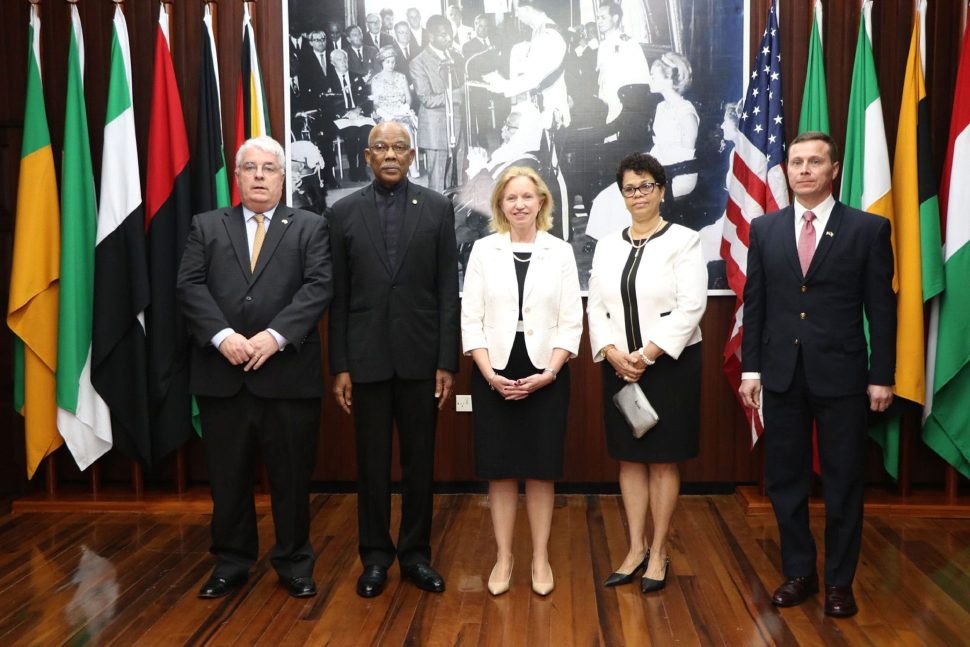Newly-accredited US Ambassador to Guyana, Sarah-Ann Lynch yesterday said her country will continue to encourage “genuinely free and fair elections…and a constitutional judiciary process” here.
“During our long relationship with Guyana, we have witnessed significant progress. We have seen a strengthening of democratic processes and political institutions, along with broader political participation and citizen representation. Moving forward, we will continue to encourage genuinely free and fair elections, freedom of speech and assembly, multiparty representation, and a constitutional judiciary process,” the ambassador said in comments just after she presented her credentials to President David Granger at the Ministry of the Presidency.
Coming at this juncture, the Ambassador’s remarks will be seen as the clearest signal yet from Washington to the Granger Administration that it is expecting elections in line with the constitution and judicial rulings. Based on the successful motion of no-confidence on December 21, 2018 against the government, elections are to be held in three months, failing which Parliament could extend the period by a vote of two-thirds of the MPs. Granger has not yet named a date for elections and is arguing that the Guyana Elections Commission has to advise him on readiness for the convening of elections. The opposition has meanwhile said that the government and GECOM are deliberately stalling elections.
President Granger seemed to respond directly to the Ambassador’s comments as he pointed out that the two countries’ relations are cemented on mutual respect which includes the “mutual non-interference in each other’s internal affairs” among others.

“We will emphasize the importance of citizen security and territorial integrity along your long-established borders. And we will encourage the protection of your natural resources and incredible biodiversity,” Lynch said in her remarks yesterday. The envoy’s reference to longstanding borders is a reinforcement of the position that it recognizes the 1899 arbitral award settling the boundary with Venezuela.
Further, as the two countries work together to achieve their common goals, Lynch said they are mindful of the ever-increasing importance of Guyana within the larger Caribbean region, as a leader in economic growth and in combatting organised crime. She noted that the two countries have a longstanding partnership that has remained strong in the face of change.
Lynch pointed out that Guyana is embarking on a time of significant transition and growth and she is excited be in the country for “this moment in history.”
“Your nation is poised to become a regional leader with unprecedented opportunity. While there are still many challenges to overcome, we remain committed to collaboration with the government and people of Guyana to rise above those challenges and prepare for a bright future,” she said.
Lynch added that together the two countries can build upon the new economic opportunities developing in Guyana. She pointed out that the US supports Guyana as it uses its resources to invest in infrastructure, increase trade, diversify the economy, and strengthen social services.
“At this moment of incredible potential, we must continue to rely on each other,” she said.
Meantime, President Granger in his remarks noted that the two countries’ relations are founded on mutual “respect for each other’s territorial integrity and sovereignty, mutual non-interference in each other’s internal affairs, cooperation for mutual benefit, respect for treaties and international law and the maintenance of regional peace and security.”
Defence
The two countries, he said, have cemented cooperation in the fields of “commerce, defence, the economy, energy, public health, public security and youth empowerment.”
According to President Granger, Guyana is committed to ensuring that the Caribbean and the South American continent remain a zone of peace. “Peace in our region could be endangered by transnational threats such as trafficking in people, weapons and narcotics; money laundering; illegal migration; environmental hazards and territorial aggressions,” he noted.
Though small, the president said Guyana has resolved to defend its territory, dismantle transnational criminal networks and develop its natural resources for the benefit of its people.
“The capabilities of the criminal cartels could exceed those of small states such as Guyana. We must seek support, through partnerships with other states which have an interest in preserving the Caribbean and the South American Continent as a zone of peace,” the president stressed.
Guyana also looks forward to the support of friendly states in its “legitimate quest to protect itself against threats to its people, its economy and its territorial integrity and sovereignty.”
While the country welcomes investment from foreign firms, President Granger said Guyana will work towards ensuring a safe, stable and secure environment for investors. In this regard, he said, the country is moving towards the establishment of a ‘green state’ within the Guiana Shield of the South American continent.
“The ‘green state’ would emphasise the protection of our environment, the preservation of our biodiversity, the promotion of renewable energy and the adoption of practical measures to ensure climate adaptation,” he further added.









